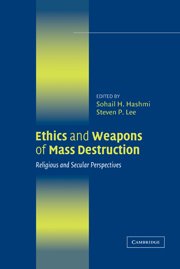Book contents
- Frontmatter
- Contents
- Tables and Figures
- Acknowledgments
- Abbreviations
- Ethics and Weapons of Mass Destruction
- Introduction
- 1 Weapons of Mass Destruction: A Brief Overview
- 2 The International Law Concerning Weapons of Mass Destruction
- PART ONE THE ORIGINAL DEBATE
- PART TWO EXPANDING THE CONVERSATION
- PART THREE CRITICAL PERSPECTIVES
- 21 A Feminist Ethical Perspective on Weapons of Mass Destruction
- 22 A Pragmatist Feminist Approach to the Ethics of Weapons of Mass Destruction
- 23 Pacifism and Weapons of Mass Destruction
- 24 Pacifism and Weapons of Mass Destruction: The Challenge of Peace
- 25 Weapons of Mass Destruction and the Limits of Moral Understanding: A Comparative Essay
- Contributors
- Index
22 - A Pragmatist Feminist Approach to the Ethics of Weapons of Mass Destruction
Published online by Cambridge University Press: 05 June 2012
- Frontmatter
- Contents
- Tables and Figures
- Acknowledgments
- Abbreviations
- Ethics and Weapons of Mass Destruction
- Introduction
- 1 Weapons of Mass Destruction: A Brief Overview
- 2 The International Law Concerning Weapons of Mass Destruction
- PART ONE THE ORIGINAL DEBATE
- PART TWO EXPANDING THE CONVERSATION
- PART THREE CRITICAL PERSPECTIVES
- 21 A Feminist Ethical Perspective on Weapons of Mass Destruction
- 22 A Pragmatist Feminist Approach to the Ethics of Weapons of Mass Destruction
- 23 Pacifism and Weapons of Mass Destruction
- 24 Pacifism and Weapons of Mass Destruction: The Challenge of Peace
- 25 Weapons of Mass Destruction and the Limits of Moral Understanding: A Comparative Essay
- Contributors
- Index
Summary
The pragmatist feminist perspective that I develop in this chapter is deeply indebted to and affirms in many respects the antiwar feminist approach outlined by Carol Cohn and Sara Ruddick in the preceding chapter, but with some marked differences. These differences, I argue, reveal more completely both the promise and the limitations of antiwar feminism.
At the outset, it is important to note that there is neither a single “feminism” nor a single “pragmatism” with which it might be aligned. Instead, there are multiple feminisms, just as there are multiple pragmatisms. The “pragmatist feminism” developed in this essay draws on several elements from American Pragmatism, a philosophical school developed in the late nineteenth and early twentieth centuries, most prominently by Charles Peirce, William James, John Dewey, and George Herbert Mead.
Despite the many differences among the pragmatists, they tend to share several features. Perhaps most salient to the subject of this volume is their presumption “that human agency in all of its higher manifestations has evolved from … concrete circumstances in which a vulnerable organism is confronted, often (if not usually) in concert with other organisms of the same species, with possibilities of both injury and fulfillment.” It is the continuous reminder of “human fallibility and finitude” that constrains pragmatists from positions such as foundationalism and dogmatism and thus against ideologies that encourage the use of armed force, and especially of WMD, in all but the most extreme circumstances.
- Type
- Chapter
- Information
- Ethics and Weapons of Mass DestructionReligious and Secular Perspectives, pp. 436 - 450Publisher: Cambridge University PressPrint publication year: 2004
- 3
- Cited by



